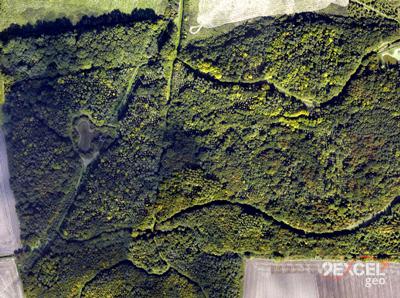
Specialist remote sensing technology provider 2Excel geo will work with experts in Mathematical Sciences at the University of Southampton on a collaborative project to remove the impact of cloud shadows from high resolution Earth Observation imagery.
The project will be funded by a grant from the £4.8 million SPRINT (SPace Research and Innovation Network for Technology) programme that provides unprecedented access to UK university space expertise and facilities. This will support 2Excel geo's development of a new application that will supply detailed airborne data to a range of industries including agriculture, conservation, risk management, ecology, landscape management and water quality.
Earth Observation imagery is often accompanied by cloud shadow which results in data being discarded or processed separately, increasing the time and cost of the data analysis exercise that enables the building of accurate predictive models for forestry and environmental monitoring. Academics from the University of Southampton will use their expertise in numerical optimisation and quantitative remote sensing to develop a technique that will reliably and accurately remove the impact of cloud shadows from high resolution Earth Observation imagery, reducing recollection costs and improving product quality for 2Excel geo's customers.
"2Excel geo were faced with a 'best guess what's under the cloud cover' challenge and so, through the SPRINT programme, we're able to help them with this by offering image analysis, optimisation and high performance computation," said Professor Jörg Fliege, Head of Operational Research within Mathematical Sciences at the University of Southampton. "The University of Southampton has one of the largest research groups in operational research in the country and our mathematical modelling expertise is a tremendous asset for this particular project."
Dr Chloe Barnes, Head of Remote Sensing at 2Excel geo added: "As a provider of airborne remote sensing services, cloud cover and cloud shadow can be a real challenge as with an average of only nine clear days per year when there's no cloud cover, it can impact our data analysis. This SPRINT project has been developed to help us to remove the effects of cloud shadow to enhance our data collection capacity.
"We have experience of engaging with a number of UK universities for Research & Development including SPRINT partner, the University of Leicester. We made a connection with the University of Southampton at one of their SPRINT events and they can offer cutting-edge research resources with prototyping methodologies that can be applied directly to our datasets."
SPRINT is supported by Research England and the Scottish Funding Council. It is being delivered by a consortium of five of the UK's leading space universities, led by the University of Leicester and including the University of Edinburgh, The Open University, University of Southampton and University of Surrey.
Northampton-based 2Excel geo delivers bespoke remote sensing solutions with a domain focus on forestry, agriculture and the environment. It merges expertise in airborne and spaceborne data analysis to provide cost effective, high performance products and services for its clients. 2Excel geo is part of 2Excel, an innovative aviation services business founded in 2005 by two Royal Air Force pilots.






